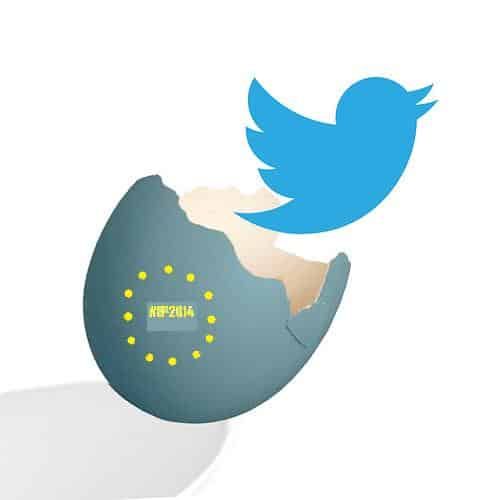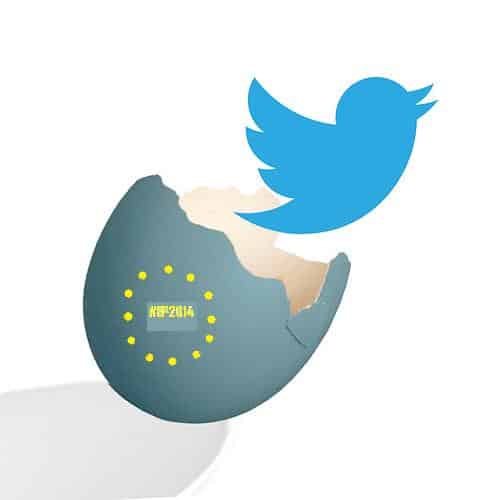
Response to @TonyLbxl’s "Will 2014 be Europe’s Twitter election?"

Tony Lockett asked the question will Twitter play a similar role to the one it played in the US 2012 presidential elections during the 2014 European elections?
I blogged: “Will 2014 be Europe’s Twitter election?” http://t.co/A7eZwVQx5Q#EP2014#Twitter#socialmedia
— Tony Lockett (@TonyLbxl) February 16, 2014
As a hyper-active Twitter user both personally and professionally, this has been a question I have been asking myself when trying to plan my election campaign and been asked by a number of friends. I even participated in a debate at Europe House in London about the question in November.
I wonder if an increase in broadcasters and celebrities on Twitter as well as Twitter is becoming more mainstream and advertisement driven will reduce the importance of Twitter in the elections. Twitter will be an important media for the election, but perhaps the invasion of mainstream-mediatypes to Twitter means that the prediction that “tweeters, not bloggers or pundits, will decide debate winners as politics shifts from a 24-hour news cycle to a 140-character one” no longer is valid for the overall twittersphere, but may still be in certain circles as Twittersphere becomes more fragmented with more users and more different types of users.
At least in Denmark, I haven’t seen signs of a full use of “online outreach, social media mobilization, and data mining” in the election campaign. It feels a bit more haphazard and instinctive rather than fact based.
There definitely is a Europe debate going on via Twitter and the internet, I think this will slowly but surely build up the missing European debate even if the traditional national mono-lingual media may not be willing to accept this as it is a threat to their business models. Trans-European media seem to still have a rough time and may never really work. Perhaps the network of http://www.thelocal.com/ may work even if this only is in English but so are the main EU-media such as FT.com, TheEconomist and EUobserver.
Twitter is very important for me in the election campaign just as it is for the rest of my life and communication. However, I don’t think that Twitter on its own will be a determining factor for my result in the election, it will need to be supplemented by other ways of interacting and getting to know the voters. Being in an EU-country that has an open list system however gives me the possibility in the first place of making a difference by drawing attention to myself as voters can make a difference in the election result via personal votes.
For the municipal elections in Denmark, Twitter and social media did not have as large an impact as the social media pundits had predicted though the pundit will never admit. Perhaps the European Elections will be different because the electoral district is so much larger. Denmark is one district for the EP elections. But I guess time will tell.
Jesper Lund
At least in Denmark, I haven’t seen signs of a full use of “online outreach, social media mobilization, and data mining” in the election campaign. It feels a bit more haphazard and instinctive rather than fact based.
I would like to think that there is a difference between United States and Denmark/Europe here, due to our data protection laws (as long as they exist). The Obama 2012 campaign was a big user of social media, but the dark side of this was the massive surveillance (profiling) of voter attitudes, based on their webbrowsing behaviour, and targeting of voters with micro-level election “promises”.
A couple of links to prove my point
http://www.forbes.com/sites/kashmirhill/2012/10/16/the-obama-and-romney-campaigns-know-if-youve-visited-porn-sites-why-do-not-track-matters/
http://www.campaignsandelections.com/magazine/us-edition/444207/4-tactics-your-campaign-should-explore-in-2014.thtml
On one hand, social media are great for facilitating contact between voters and candidates since voters can engage the candidates they want, rather than the ones that happen to show up at the City2 shopping center. This is good, especially for the lesser known candidates that are not invited to the debates on national TV.
On the other hand, using social media (as they currently function) means that contacts between voters and candidates are no longer anonymous from the point of view of the voter (unlike meeting candidates at City2), and they become subject to political profiling, something that is (rightfully) frowned upon in European data-protection regulation. Some candidates may do this profiling themselves, hoping to target voters with micro-level election “promises” in order to secure votes, but even if candidates do the right thing and refrain from this abuse, we can rest assured that Facebook and Twitter are profiling us for commercial purposes, as we (citizens/voters) are the product of their “free service” business model. And there are always candidates, or even political parties, that will not do the right thing.
Overall, the social-media concept is, generally, a good thing for elections, but we really don’t have the right social-media tools for this from the point of view of voters (citizens).
A strong European data protection regulation with effective enforcement could perhaps facilitate this for the 2019 European elections, but now I am dreaming.